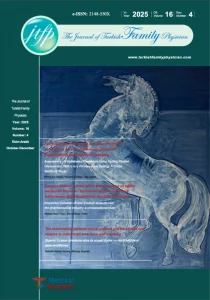A Case of new onset hyperuricemia in a home health care patient with multiple chronic diseases
Introduction: Continuity of care in primary care is important both for the management of diseases and also recognizing new situations. In this case report, approach to a home health care patient with new onset hyperuricemia has been discussed.
Case: A 75 year old woman with congestive heart failure, hypertension, type 2 diabetes, atrial fibrillation, chronic kidney disease and stroke history is being monitored by Marmara University Home Health Care Services. In a routine blood test due to her kidney disease, the serum uric acid was found to be 14 mg/dl. When consulted with nephrology, this rise was not attributed to the kidney, citing a creatinine drop from 2.85 md/dl to 1.89 mg/dl and all other electrolyte levels being in the normal limits, and only daily allopurinol 150mg was recommended. Because of the uric acid level rise from 8-9 mg/dl to 14 mg/dl in a relatively short time, a visit was planned to rule out possible etiologies. During the visit, the patient did not have any complaints. We learned that her diet was not rich in meats, but she had a weight loss of 20 kg in 8 months. Also, we found out that the patient had breast cancer in 2001. Because it had been 15 years since the last treatment, the caregivers had not thought of it during prior history takings. There were no pathological findings in her physical examination. After ruling out other causes of hyperuricemia, the patient was consulted to geriatrics due to her cancer history, weight loss, and uric acid rise. They recommended ordering a PET scan to screen for cancer.
Discussion: In this case, the reasons that elevate serum uric acid levels are examined and the importance of continuity of care in primary care is emphasized.
References
- Feig DI, Mazzali M, Kang DH, Nakagawa T, Price K, Kannelis J, & Johnson RJ. Serum uric acid: a risk factor and a target for treatment? Journal of the American Society of Nephrology 2006;17(4 suppl 2): 69-73.
- De Oliveira EP, Burini RC. High plasma uric acid concentration: causes and consequences. Diabetology & metabolic syndrome 2012; 4(1):12.
- Ichida K, Matsuo H, Takada T, Nakayama A, Murakami K, Shimizu T. et al. Decreased extra-renal urate excretion is a common cause of hyperuricemia. Nature communications 2012;3:764.
- Bendersky G. Etiology of hyperuricemia. Annals of Clinical & Laboratory Science 1975; 5(6):456-67.
- Luk Andrew J, Simkin Peter A. Epidemiology of hyperuricemia and gout. Am J Manag Care 2005;11(15 Suppl): 435-42.
- Yokogoshi Y. & Saito S. Abnormal serum uric acid level in endocrine disorders. Nihon rinsho. Japanese journal of clinical medicine 1996;54(12):3360-3.
- Sackey K. Hemolytic anemia: part 1. Pediatrics in review 1999;20:152-9.
- Spivak JL. Polycythemia vera: myths, mechanisms, and management. Blood 2002;100(13): 4272-90.
- Makinouchi T, Sakata K, Oishi M, Tanaka K, Nogawa K, Watanabe M. et al. Benchmark dose of alcohol consumption for development of hyperuricemia in Japanese male workers: An 8-year cohort study. Alcohol 2016;56:9-14.
- Jamnik J, Rehman S, Mejia SB, de Souza RJ, Khan TA, Leiter LA. et al. Fructose intake and risk of gout and hyperuricemia: a systematic review and meta-analysis of prospective cohort studies. BMJ 2016;6(10):e013191.
- Dincer HE, Dincer AP. & Levinson DJ. Asymptomatic hyperuricemia: to treat or not to treat. Cleveland Clinic journal of medicine 2002; 69(8):594-608.
- Yiu A, Van Hemelrijck M, Garmo H, Holmberg L, Malmström H, Lambe M. et al. Circulating uric acid levels and subsequent development of cancer in 493,281 individuals: findings from the AMORIS Study. Oncotarget 2017; 8(26): 42332.



